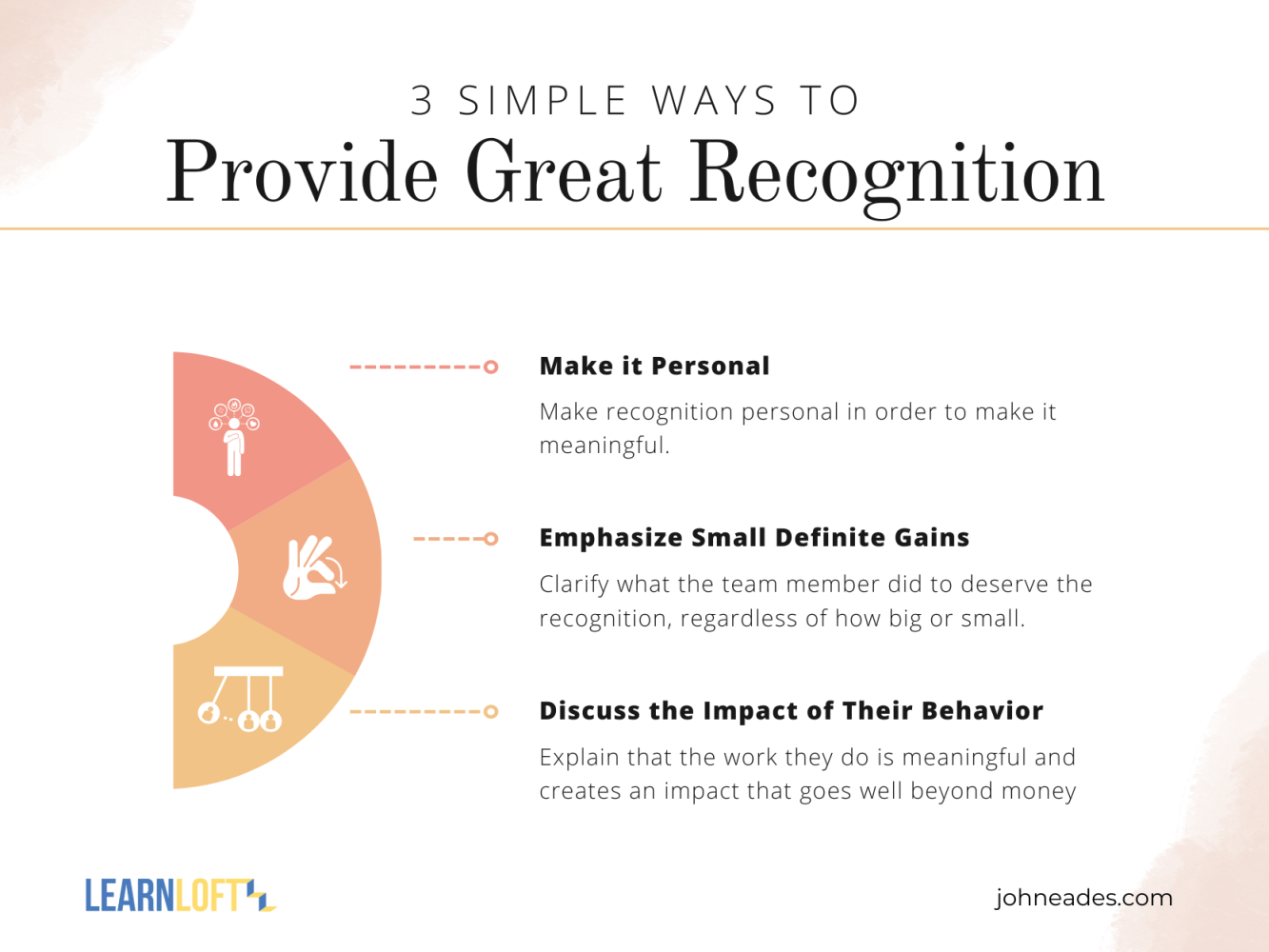Comments
- No comments found

Great leaders can inspire their teams by setting a great example, telling fantastic stories, or instilling hope through a monumental vision.
These are all powerful approaches, which one could argue are required techniques to lead in today's modern workplace effectively.
However, there is a more straightforward strategy that most managers need to take advantage of daily. Author Fred Reichheld said, "Giving praise and recognition is the secret ingredient great leaders use to inspire their team because it provides the essential fuel to win on purpose."
A lot of managers don't take this advice. Take Jalen, an area manager in a construction company, as an example. He began seeing a pattern of complacency, high voluntary turnover, and a lack of effort daily from team members. So Jalen did what most young managers would do. He increased the level of accountability and gave a lot of critical feedback. He was convinced his efforts would pay off, but instead, they had an inverse effect.
Finally, at his breaking point, he opened himself up to a different approach relying on recognition. Instead of focusing so much on what people were doing wrong, he leaned into what they were doing right. Something unique happened, people responded beautifully, and the team's performance immediately improved.
I learned in a coaching call that Jalen didn't initially provide his team recognition because he believed it would create a complacency spiral and an attitude of average. Jalen figured out before it was too late that recognition has the inverse effect. The leadership principle I shared with Jalen is one I want to remind you of as well:
The quickest way to unite is to focus on what someone is doing right. The fastest way to divide is to focus on what someone is doing wrong.
This doesn't mean leaders like Jalen should only provide recognition or refuse to have tough conversations. It's very much the opposite. However, the more you provide recognition, the more impactful your critical feedback will be.
Most people tend to use the words recognition and praise interchangeably. While similar, there are some essential differences. Recognition involves specific feedback that promotes the positive behavior you want to be demonstrated on your team. It tends to focus on behaviors, results, or positive outcomes. Praise, on the other hand, is a warm approval that tends to be more generic and less actionable.
Recognition = Specific feedback that promotes positive behaviors in the future
Praise = Generic approval that is less actionable
Authentic recognition is much more potent for leaders to leverage because it's derived from valuable insights and detailed observations. It demonstrates to a team member that you are present, watching, and caring.
If all you do is praise positive results, you tell your people you only care about the outcomes, not the person or the process that produces the results.
Most managers and leaders don't recognize the short-term benefit or long-term impact recognition has on their team members. Because of this, they aren't doing enough of it. A study by Glassdoor found that 80% of employees would be willing to work harder for an appreciative boss, and 70% said they'd feel better about themselves and their efforts if their boss thanked them more regularly. If that weren't important enough, 63% of employees who feel recognized are unlikely to look for another job. Another study shows that those who rarely receive recognition think their manager does not trust them.
There isn't a better way to say this, recognition increases employee engagement and renews team members' commitment to the cause.
Since giving recognition isn't a strong suit for most leaders, here are ways to improve:

People are wired differently. Some people would do anything for their name to be recognized publicly, and for others could make them want to crawl into a hole. The point is that the best leaders make recognition personal in order to make it meaningful. This requires a personal relationship and a strong bond of mutual trust.
Great leaders make recognition personal in order to make it meaningful
Bob Chapman wrote the book "The Five Love Languages," which has helped countless marriages better connect with their spouse. If you aren't familiar with the book, the five love languages are:
Words of Affirmation
Quality Time
Physical Touch
Acts of Service
Receiving Gifts
I share these with you not so you can have a romantic relationship with team members, but it can provide valuable insight into how they like to receive recognition.
Clarify what the team member did to deserve the recognition, regardless of how big or small. Instead of just focusing on the result of their work, focus on the behavior that produced it. It could be things like their attitude, effort, or coachability. The point is no action is too small to be recognized.
Great recognition focuses on the behavior that produced the outcome, not the result itself.
Highlight their behavior's impact on the team, organization, or themselves. This is critical and often forgotten or assumed. Unless you work in sales, it can be difficult to draw a direct correlation between behavior and outcome. However, the more leaders talk about the real impact, the longer the recognition lasts.
The more you talk about real impact the longer the recognition lasts.
Team members need to know that their work is meaningful and creates an impact that might go well beyond money. Take time to spell out what good things happened or could happen because of their extra effort.
I am more convinced than ever that leaders can only have a fully engaged team if they provide authentic recognition on an ongoing basis. However, since your leadership is temporary, stop waiting to give recognition, do it today.
John is the CEO of LearnLoft, author of, F.M.L. Standing Out & Being a Leader and host of the 'Follow My Lead' Podcast. He writes or has been featured on Inc.com, LinkedIn Pulse, TrainingIndustry.com, eLearningIndustry.com, CNBC Money, and more. John completed his education at the University of Maryland College.
Leave your comments
Post comment as a guest